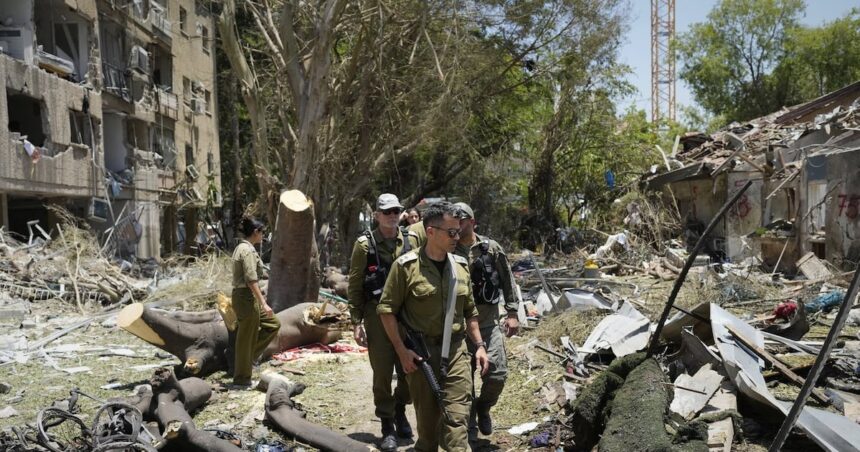I’ve just landed in Tel Aviv, where the acrid smell of smoke still hangs in the morning air. The city’s normally bustling Dizengoff Street sits eerily quiet, with shattered glass crunching beneath my feet as I navigate past the cordoned-off impact zone of yesterday’s Iranian missile strike.
“We heard the sirens and had less than two minutes to reach the shelter,” recalls Eliana Katz, 63, who owns a small café just 400 meters from where the missile hit. “The building shook like nothing I’ve experienced before. Not during the 2023 conflict, not during anything.”
The attack marks a dangerous new escalation in the rapidly deteriorating Middle East situation, coming just 72 hours after U.S. airstrikes targeted what the Pentagon described as “nuclear-adjacent facilities” near Isfahan. President Watkins authorized those strikes following intelligence reports suggesting Iran had accelerated uranium enrichment beyond previously estimated timelines.
What’s remarkable about yesterday’s Iranian response is not just its unprecedented direct targeting of Tel Aviv’s commercial district, but the calculated precision. Unlike previous attacks that relied on proxy forces or drone swarms, this was a single hypersonic missile that Israeli defense systems failed to intercept—a technological gap that has regional security experts deeply concerned.
“This represents a significant shift in Iranian military doctrine,” explains Dr. Maya Levinson from the Institute for National Security Studies in Tel Aviv. “They’ve demonstrated both technical capability and strategic restraint by limiting civilian casualties while still delivering a message about their retaliatory capacity.”
According to Israel Defense Forces spokesperson Colonel Avital Leibovich, the missile struck at 2:17 p.m. local time, causing extensive structural damage to three commercial buildings but resulting in only 14 injuries and no fatalities. IDF sources suggest this was likely intentional—the timing and target location suggest Iran wanted to demonstrate capability without triggering full-scale war.
In Washington, the State Department has called for “immediate de-escalation” while maintaining that the original U.S. strikes were “necessary and proportionate” to address Iranian nuclear advancement. Secretary of State Katherine Chen has been engaged in marathon phone calls with European and Gulf partners, seeking to prevent further spiral.
European Union foreign policy chief Miguel Sánchez-Torres expressed frustration with both sides. “We are witnessing a dangerous game of military brinkmanship that threatens to undo years of diplomatic work,” he told reporters in Brussels this morning. The EU has offered to host emergency talks between all parties.
Walking through Tel Aviv’s damaged business district today, I’m struck by the juxtaposition of destruction and normality. Just blocks from the impact site, cafés are reopening, though patrons nervously glance skyward at the sound of passing aircraft. Israel’s Iron Dome batteries remain visibly active on the city’s periphery, a reminder that the military expects possible follow-up attacks.
The missile strike has intensified political pressure on Prime Minister Ben-Gideon, whose coalition government was already fragile before this crisis. Far-right cabinet members are demanding massive retaliation against Iran, while opposition leaders question why Israeli intelligence failed to anticipate the attack despite clear warning signs.
“We cannot allow this to go unanswered,” declared Defense Minister Ariel Shavit at an emergency cabinet meeting, according to sources present. “But we must be strategic about our response.”
Iran’s UN Ambassador Javad Rahimi defended the strike as “a limited and proportionate response to American aggression against sovereign Iranian territory.” In a statement to the Security Council, he emphasized that Iran “intentionally avoided civilian targets” and has “no desire for expanded conflict, but will not tolerate attacks on its soil.”
The timing is particularly sensitive given next month’s planned nuclear negotiations in Geneva, which now appear increasingly unlikely to proceed. IAEA inspectors who were set to return to Iran have had their visit indefinitely postponed, further complicating verification efforts.
For ordinary Israelis like Michal Brenner, who I met clearing debris from her damaged boutique near Dizengoff Square, these diplomatic complexities feel remote compared to immediate security concerns.
“My children didn’t sleep last night,” she told me, hands dusty from sweeping up broken merchandise. “Every sound made them jump. We’ve lived through rockets before, but this feels different—like we’re pieces in a much larger game.”
Oil markets have reacted strongly, with Brent crude jumping 8% overnight on fears of broader regional disruption. The European Central Bank has warned of potential economic spillover effects if the situation escalates further, particularly regarding energy security as winter approaches.
Military analysts point to several critical questions that will determine what happens next: Will Israel strike directly at Iranian territory rather than proxy targets? Will the U.S. support or restrain Israeli response options? And can diplomatic channels established during previous crises be effectively utilized before miscalculation leads to wider war?
As night falls over Tel Aviv, the city’s skyline glitters as usual, but with noticeably fewer lights in the damaged district. Air raid sirens tested earlier today sent people running to shelters, a reminder that for residents here, yesterday’s strike may be just the beginning of a dangerous new chapter in this volatile region’s history.






